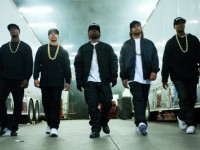By TOM MOORE
Race and diversity played central roles in 2015 films with audience and critics sounding off when they felt something may have crossed the line.
Racial stereotyping and diversity issues have been “tricky pitfalls” for directors and the film industry itself for decades, but this year with critics charging that Hollywood has omitted actors and filmmakers of color, the debate has gone center stage.

“There is clearly a heavy bias that Hollywood has towards seeing value with movies with white actors and white stories,” said Matt Gilbert, who runs the Ramapo College Film Club. “While there are films about black characters, it is still clearly far outnumbered and that’s why a lot of people think that Hollywood has a diversity problem.”
Straight Outta Compton was one of the many films that was called out for this. While being a film that is about race itself in it’s discussions of the racial struggles of the musical group N.W.A., the film got a lot of flak for many others feeling they had a racist casting call. The casting call asked for four different types of girls based off race and body types, as found in a WhatCulture.com article. The main argument that came from this was that the “A-girls” consisted of models and could be any race, while the “D-girls” consisted of poor and “not in good shape” women that could be only African American.
Other issues of race and diversity came from many films that “whitewashed” and miscast actors into characters that were not the same race as them.

“Whitewashing” is a term in the film industry that is for when a director casts a white actor or actress that play a character of a different race or ethnicity. This idea of “whitewashing” was caught in the film Pan when white actress Rooney Mara was cast to played a Native American character named Tiger Lily. Audiences had such an issue with this that they even created a petition for Hollywood to stop casting white people as people of color.
Xenophobia, the fear of or irrational dislike of people from other countries, was also a prevalent idea noticed in one of the most marketed films of the year, No Escape.
The film centers around a white American husband, played by Owen Wilson, and his family moving to an unnamed Asian country when a “coup” or rebellion comes about and all of the foreigners are being executed on the streets. No Escape screamed xenophobia to many audiences and received much backlash its promotion of white Americans and slandering foreigners.
Is Race Always the Issue
While there are many previous examples of how race and diversity issues can exist in films, there has also been a backlash towards acknowledging these issues because of blatant and odd criticisms of films for being “racist.”
One of the biggest films of the year, Star Wars: The Force Awakens, was called out by many internet users and fans for being “anti-white.” This argument, against the box-office record breaking film, stemmed from the casting of a diverse group of actors which, to them, promoted “white genocide” to its core white male audience. This argument was seen all over social media sites and forums posts alike with the hashtag: BoycottStarWarsVII
#BoycottStarWarsVII because it’s nothing more than a social justice propaganda piece that alienates it’s core audience of young white males.
— Dissident American (@officialCritDis) October 19, 2015
Another box-office titan, Jurassic World, was also called out for having racially motivated issues in its dialogue. After many fans went to see the film, there was a line in the film that struck some audience members as a racial blur. The line in the film being, “The Pachy [short for Pachycephalosaurus] are out of containment” was seen as a parallel to “Pachys” being a another form of “Pakis,” meaning Pakistani people.
This was seen by most as a far stretch if anything and begs the question if race is always just an issue to be called on with people.
When asked about this, in connection to the Jurassic World incident, Ramapo student Evan Cordero, 20, believed “some people are a little jumpy to use the ‘race card’ in an discussion and think that is all that it can be.”
Oscar Boycott 2016
With all of these arguments coming into play throughout the year, it has all lead to what is currently happening with the upcoming Academy Awards ceremony. Many African American actors and actresses are telling people to boycott the Oscars because of its lack of diversity among its nominees. They are arguing that there needs to be better perceptions of non-white actors and filmmakers in the industry.
For the longest time, it has been seen by many that the Oscars has shown their preference of white actors and filmmakers over non-white actors and filmmakers. This has raised questions of whether or not their is a prejudice of the Oscars and whether the members of the Academy are diverse enough to pick nominees without prejudice.
With the big diversity problem debate that has come up, the Academy is making historic changes for the future of the Oscars by changing the voting rights and voting terms of it’s current members. Doing this will give a chance for a more diverse voting panel on the Academy board and offer more diverse opinions that people are looking for.
Academy President Cheryl Boone Isaacs says that they are going to “lead” the start on making film more diverse and ending the diversity problem they face. Isaacs also commented that these new measures that the Academy is taking “regarding governance and voting will have an immediate impact and begin the process of significantly changing our membership composition.”
This story explains the issue with the film industry with a strong leading quote and some background information, leading us to the actual problem itself. The section titled “Is Race Always The Issue” I found extremely interesting because as a Star Wars fan, I understand the controversy behind the movie.
I was not aware of the backlash saying that the movie is “anti-white”. The assets to the story were extremely interesting and helped support the details at the beginning of the story, as well as the lead.
Overall, the story itself was very informative, well-organized and written, and was able to shine a light on diversity in the film industry, with the inclusion of the Oscars Boycott and Star Wars controversies.